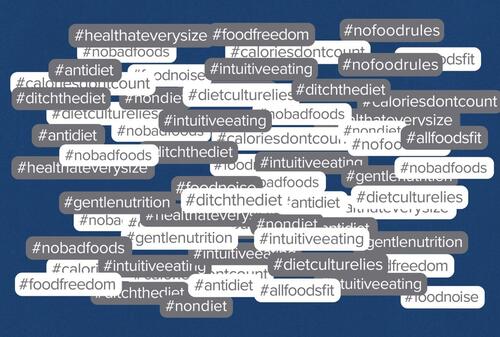
In news that some could as a surprise to no one, the people leading the charges against "fat shaming" and advocating for something called "anti-dieting" are...you guessed it...food companies.
People following the online trend are finding themselves (surprise!) gaining weight. That includes Jaye Rochon, who the article profiled. She followed a "health at every size" mindset and...voila....was stunned when she put on 50 pounds, tipping the scale near 300 pounds.
Under the guise of coming off as woke and encouraging "health at any weight" (as if that's actually a thing), the Washington Post revealed this week that General Mills, behind closed doors has been "touting anti-diet research it claims proves the harms of 'food shaming.'"
While a company spokesperson said it “works closely with a variety of scientific, health, nutrition and other credentialed experts to ensure we provide accurate, evidence-based information,” the Post revealed the company has hired lobbyists to oppose federal policies adding health info to food labels.
Amy Cohn, General Mills' senior manager for nutrition and external affairs, promoted anti-diet messaging to dietitians at a national food conference last fall, the report says. She criticized the media for shaming processed foods and consumers.
"You can help derail the cycle of shame," Cohn urged the dietitians. Yeah, and add 50 pounds to your client's ass in 6 months.
Kathryn Lawson, a dietitian that works at Nestlé (what?), tweeted during the session: "People need to feel heard and seen to break the cycle of shame around weight loss and eating."
Online dietitians, often backed by food makers, are gaining large followings by promoting anti-diet messages. Hashtags like #NoBadFoods and #FoodFreedom are widespread on social media.

The Post and The Examination reviewed 6,000 posts by 68 dietitians with 10,000+ followers. About 40% used anti-diet language, reaching over 9 million people. Most of these influencers were paid by food, beverage, and supplement companies.
Last year, at least 10 dietitians promoted General Mills cereals on TikTok and Instagram using the hashtag #DerailTheShame, often showing personalized Cheerios boxes and denouncing food shaming.
In a November 2023 TikTok video, "anti-diet" dietitian Cara Harbstreet promoted General Mills' sugary cereals like Cinnamon Toast Crunch and Trix, advocating for "fearlessly nourishing meals, including cereal." The video, labeled "#sponsored," disclosed her partnership with General Mills.
Harbstreet later stated in an email that she is "no longer actively partnering" with the company.
Meanwhile, the U.S. obesity rate has more than doubled since the 1980s, with nearly half a million early deaths annually linked to excess body weight, the report says.
Sen. Richard Blumenthal commented: "I think it is really reprehensible for the food industry to prey on the vulnerabilities of people who suffer from diabetes or obesity or diseases that are caused by excessive sugar, fat and perhaps other ingredients that do them harm. To tell people they should be proud of eating the wrong things, that’s hardly doing them a service.”
Sounds like fat-shaming man-splaining to us...
You can read the Post's full analysis here.
In news that should come as a surprise to no one, the people leading the charges against “fat shaming” and advocating for something called “anti-dieting” are…you guessed it…food companies.
People following the online trend are finding themselves (surprise!) gaining weight. That includes Jaye Rochon, who a Washington Post article profiled. She followed a “health at every size” mindset and…voila….was stunned when she put on 50 pounds, tipping the scale near 300 pounds.
Under the guise of coming off as woke and encouraging “health at any weight” (as if that’s actually a thing), the Washington Post revealed this week that General Mills, behind closed doors has been “touting anti-diet research it claims proves the harms of ‘food shaming.'”
While a company spokesperson said it “works closely with a variety of scientific, health, nutrition and other credentialed experts to ensure we provide accurate, evidence-based information,” the Post revealed the company has hired lobbyists to oppose federal policies adding health info to food labels.
Amy Cohn, General Mills’ senior manager for nutrition and external affairs, promoted anti-diet messaging to dietitians at a national food conference last fall, the report says. She criticized the media for shaming processed foods and consumers.
“You can help derail the cycle of shame,” Cohn urged the dietitians. Yeah, and add 50 pounds to your client’s ass in 6 months.
Kathryn Lawson, a dietitian that works at Nestlé (what?), tweeted during the session: “People need to feel heard and seen to break the cycle of shame around weight loss and eating.”
Online dietitians, often backed by food makers, are gaining large followings by promoting anti-diet messages. Hashtags like #NoBadFoods and #FoodFreedom are widespread on social media.

The Post and The Examination reviewed 6,000 posts by 68 dietitians with 10,000+ followers. About 40% used anti-diet language, reaching over 9 million people. Most of these influencers were paid by food, beverage, and supplement companies.
Last year, at least 10 dietitians promoted General Mills cereals on TikTok and Instagram using the hashtag #DerailTheShame, often showing personalized Cheerios boxes and denouncing food shaming.
In a November 2023 TikTok video, “anti-diet” dietitian Cara Harbstreet promoted General Mills’ sugary cereals like Cinnamon Toast Crunch and Trix, advocating for “fearlessly nourishing meals, including cereal.” The video, labeled “#sponsored,” disclosed her partnership with General Mills.
Harbstreet later stated in an email that she is “no longer actively partnering” with the company.
Meanwhile, the U.S. obesity rate has more than doubled since the 1980s, with nearly half a million early deaths annually linked to excess body weight, the report says.
Sen. Richard Blumenthal commented: “I think it is really reprehensible for the food industry to prey on the vulnerabilities of people who suffer from diabetes or obesity or diseases that are caused by excessive sugar, fat and perhaps other ingredients that do them harm. To tell people they should be proud of eating the wrong things, that’s hardly doing them a service.”
Sounds like fat-shaming man-splaining to us…
You can read the Post’s full analysis here.
Loading…





